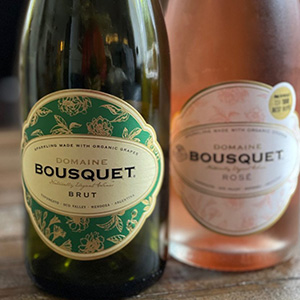At these prices, these are two very charming bottles of sparkling wines I would gladly sip on the daily
Domaine Bousquet Brut
Fruit for this wine is sourced from their estate vineyards, planted on gravel and sandy soil in the Tupungato, Alto Gualtallary, Uco Valley (Mendoza) Argentina at about 4,000 feet altitude.. It’s blend of 75/25% hand-picked Chardonnay/Pinot Noir fermented on selected yeast. Second fermentation in stainless steel tanks.
Pale straw yellow color with inviting green apple, fresh squeezed Key lime, lemon and a hint of talc aromas. On the palate it’s medium-bodied and nicely balance vibrant acidity and a creamy mousse, with flavors that echo its aromas. Residual Sugar – 9.5 g/L|ABV – 12%| SRP – $13
Domaine Bousquet Brut Rosé
Fruit for this wine is sourced from their estate vineyards, planted on gravel and sandy soil in the Tupungato, Alto Gualtallary, Uco Valley (Mendoza) Argentina at about 4,000 feet altitude. It’s blend of 75/25% hand-picked Pinot Noir/Chardonnay fermented on selected yeast. Second fermentation in stainless steel tanks.
Pale salmon color with strawberry, raspberry , lime zest and talc aromas. On the palate, it’s medium-bodied, dry and very fresh with tart red fruit flavors that echo its aromas complicated with an appealing mineral notes. Residual Sugar – 8.2 g/L|ABV – 12%| SRP – $13
I recall a webinar where Wine Bible author Karen MacNeil stated that she drinks a glass of Champagne every night. At these prices, these are two very charming bottles of sparkling wines I would gladly sip on the daily. They’re affordable and over-deliver for the price!
About Domaine Bousquet
During a vacation to Argentina in 1990, third-generation French winemaker Jean Bousquet (Boo-SKAY) fell in love with the Gualtallary Valley, a scenic, remote, arid (dessert really) terrain high in the Tupungato district of the Uco Valley in Argentina’s Mendoza region, close to the border with Chile. With altitudes ranging up to 5,249 feet, Gualtallary occupies the highest extremes of Mendoza’s viticultural limits.
Bousquet was so convinced of the potential of the region, he began divesting himself, bit by bit, of virtually everything he owned, including the family winery and vineyards in Pennautier, near Carcassonne in Southwest France.
In 1997 Bousquet purchased about a 1,000 acres of under developed land: tracts of semi-desert, nothing planted, no water above ground, no electricity and a single dirt track by way of access. Locals dismissed the area as too cold for growing grapes. Bousquet, on the other hand, reckoned he’d found the perfect blend between his French homeland (high acidity, cool climate) and the New World (sunny, with a potential for relatively fruit-forward wines).
Whenever, the need arose, Bousquet would sell off portions of his initial 988 acres, retaining just 173 acres by the time he released his first vintage in 2005. Bottle by bottle, money was raised to buy a vat or equipment. Today, Domaine Bousquet is housed in a striking modern winery, complete with a hospitality area and restaurant.
Bousquet’s daughter, economist Anne Bousquet, and her husband Labid Al Ameri, a successful trader with Fidelity in Boston, found themselves increasingly drawn to the cause, including the opportunity it offered to put their shared philosophy on sustainability into effect. After a 2002 trip to Argentina, the couple began to invest in Domaine Bousquet. In 2005, Al Ameri joined his father-in-law full time, helping with the construction of the winery. Anne continued her work as an economist, before joining the company in 2008. In 2009, the couple moved to Tupungato full-time, assuming full ownership of Domaine Bousquet in 2011 explains the Bousquet website
Sustainability, Climate Action and Social Responsibility
Both of these wines are organic certification (Ecocert), Vegan (Veg Argentina), Gluten-free and sustainable (Bodegas de Argentina) and made with respect for human and environmental rights (Fair for Life). Futhermore, biodynamic principles are also being used in their vineyards and Demeter Biodynamic certification expected soon. Bousquet is also working toward becoming a Certified B Corporation.
Additionally, recognizing that farming alone isn’t enough to address the critical issue of climate action, Domaine Bousquet is a founding member of the Sustainable Wine Roundtable (“SWR”), a unique coalition of leading wine brands, small producers, distributors, retailers, and environmental organizations who are united in their commitment to make the wine sector a leader in sustainability.
A global problem, a global solution. It’s common sense. As a trained economist, I firmly believe climate change must be combated with practical, implementable, and measurable global sustainability standards. With some of the best minds and leaders in the wine industry working together via the Sustainable Wine Roundtable, we can win the battle.” — Co-owner Domaine Bousquet, Anne Bousquet
From droughts, to flooding, raising temperatures and wildfires. Social pressures around workers’ rights and diversity, the wine industry, like many others, has significant issues that need addressing, and SWR committed to raising awareness around these issues and developing best practices to address them.

